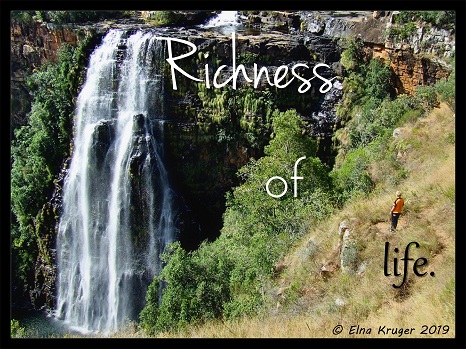| Back to Back Issues Page | |||||||||
 |
|||||||||
|
TO THE POINT: Richness of Life February 25, 2019 |
|||||||||
RICHNESS OF LIFE
I am learning that there is a certain richness added to a child’s life just by involving them in your life, expecting things from them and involving them in a variety of experiences whether outings, activities or going places. If this ‘richness’ is missing, a huge gap is created, which is difficult to fill later on. With this gap, learning is more difficult.
So here goes some observations we often assume happens in all households:
· Books are readily available to look at, page through and read! (Not so, as I have found out.)
· Children are exposed to variety of enriching life experiences so that they have a built-in richness of vocabulary they can associate words with. (Not true, not all children have a wide exposure to many different life experiences.)
· Having discussions and lots of conversations with your children as parents, about a wide variety of topics is done by most parents. Topics can include politics, government, religion, society, laws, economics and all subject areas learnt about in school. (Again I learnt this is just not true, in many households there is very little discussion about anything deeply, if at all.)
· Children take responsibility for their own learning because they want to learn more. (No they don’t, if they have not been expected to, especially if it was taken from them and they were spoon-fed in a system where a teacher determines the scope, speed and variety of everything learnt.)
· Parents are involved in their children’s learning processes and they take an interest and care what they learn about. (Again not so, there are many parents not even aware of what their children learn. This also becomes even more paramount the older the child gets.)
I now believe that the following 5 things are needed to enrich a child’s life such that he/she can learn better:
· Have books readily available – you don’t have to own them all, but have things to read available, always. Especially interesting topics, and especially about things they are interested in.
· Expose your child to a wide and rich variety of life experiences to expand their vocabulary. If they have a lot of life experiences they can read and write much better, leading to a better understanding and sharing of information.
· Charlotte Mason’s narration concept, where a child needs to talk to you and say what he/she has learnt, is at the heart of learning the skill of conversation. To be able to converse well, to express yourself clearly, to say something, to have an opinion is core to communicating and leading in today’s world of information. Parents need to have interesting conversations about many things with their children, so they can hear different viewpoints, explained in words and with logic, else they will only have conversations with peers narrowing/limiting their conversation skills. (refer to ezine June 2017)
· When a child is given responsibility and expected to take responsibility, they do take it, and they will grow in taking even more and more as they grow older and their responsibilities grow even wider. But this is crucial with regards to their own learning, especially during the high school years, so they can be empowered to put in the energy and motivation needed to succeed on their own. Obviously parents/tutors/teachers act as coaches during this time, but the child should make the shift towards taking ownership.
· Education especially in younger years is the primary place where one can influence and shape children’s paradigms and how they think about the world, themselves, others and God. Therefore parents need to be very wary what their children are learning especially if they (the parents) are not making the choices.
Be involved and know what your children learn, as it will be most difficult to change as they grow older. Not everything that is in a book, or that somebody says, is true. Don’t be afraid to voice your opinion and share your value system with your children. But also keep in mind they will assimilate your values more by what you do than by what you say, so model what you want them to learn!
Let us aim to give our children the best we can, by surrounding them with books, experiences and modelling what we want them to learn.
As always, I enjoy feedback especially if this has meant something for you. Sharing this will also be much appreciated!
AN INVITATION:Homeschooling Curriculum Guide would like to invite ANY subscriber who has something to share, something to say, or just want to contribute to encouraging others to please contact me.I am looking for a number of contributions to publish in the monthly ezine. Contact me either via phone on 0837112246 or via my personal email. A REMINDER:If anyone need help in planning their curriculum for the year do get the Homeschooling Guides to help you. Titles include : · Considering Home education · How to start Home education · Child Development Phases · Home Education in South Africa · Organisation, administration and socialization · The 7-step process to improve your homeschool · A personal eclectic curriculumFor those young ones eager to read and write, get Omvattend Afrikaans for a complete Afrikaans Foundation phase programme. Nothing else is as comprehensive, guaranteed to teach reading and writing Afrikaans effectively. And thinking of getting creative? Get the South African Art series for Children where you can explore artists and their work?
I always get where I am going by walking away from where I was. (Winnie the Pooh)
Want more info?
Need curriculum?
Copyright © 2018, Homeschool Curriculum Guide |
|||||||||
| Back to Back Issues Page |
